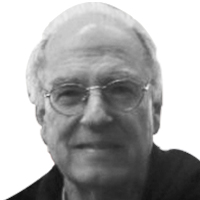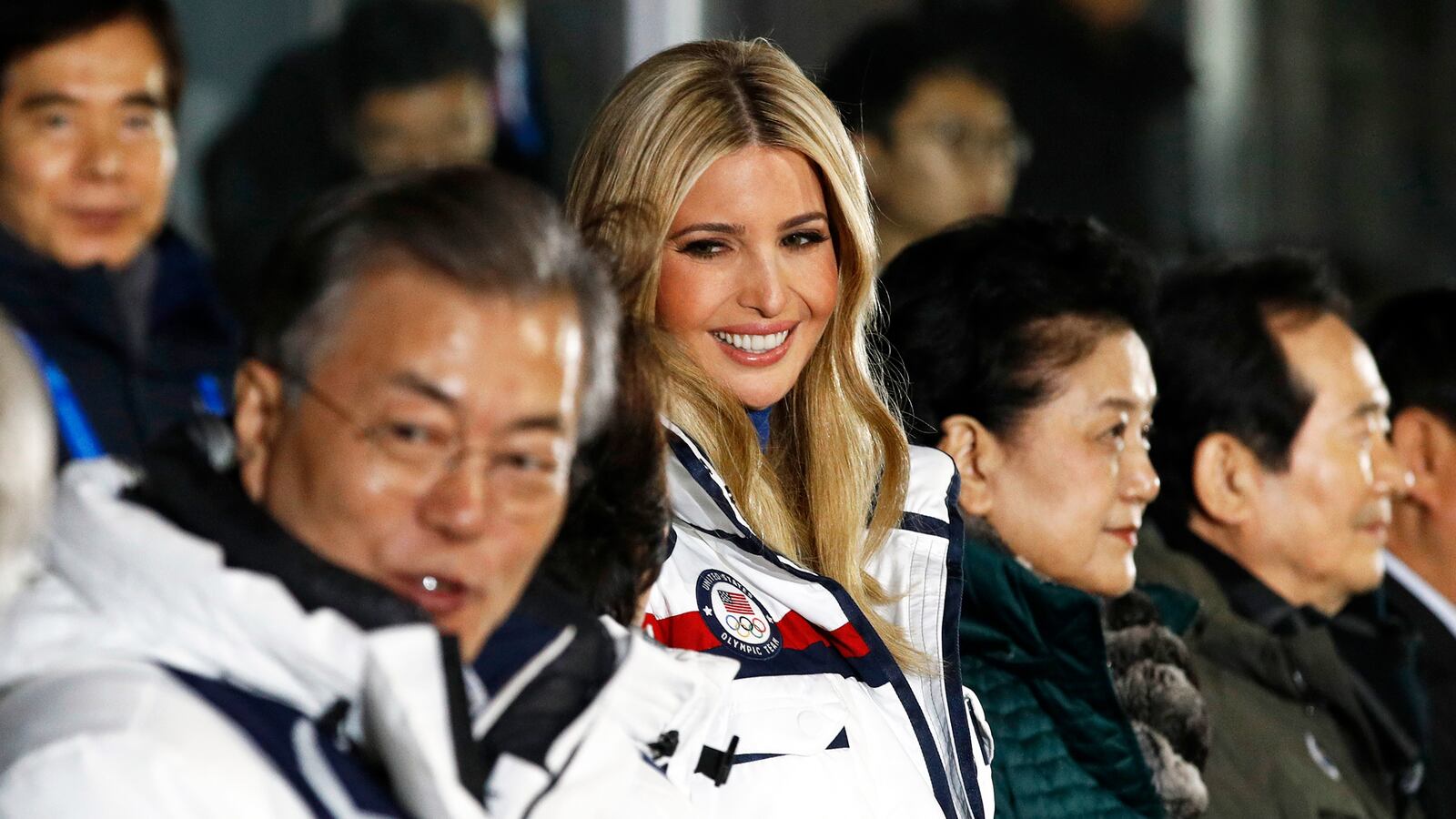PYEONGCHANG, South Korea—Ivanka Trump and North Korea’s General Kim Yong Chol came within a few feet of each other but avoided exchanging glances, much less shaking hands, at Sunday’s lavish ceremonies marking the end of the Winter Olympics.
If the mutual cold shoulder in the VIP box of the Olympic Stadium seemed like a bad omen, at least Ivanka was beaming while South Korea’s President Moon Jae-in and Kim Yong Chol greeted one another. In an exercise in which appearances do count, Ivanka’s image was far more pleasing than that of Vice President Mike Pence, who looked on sternly from his seat at the Opening Ceremonies 16 days ago, one row in front of the younger sister of North Korean leader Kim Jong Un.
As for Moon, he and his aides clearly believed he had scored a diplomatic breakthrough, beginning with his initial agreement to welcome more than 500 North Koreans—mostly cheerleaders and musicians—for the Games that opened with North and South Korean athletes parading under a one-Korea unity flag. On the banner, an image of the Korean peninsula stood out in light blue against a white field. If Pence did not stand up to applaud the “one-Korea team,” Ivanka was at least seen smiling happily throughout. The Koreans, far from having to carry the unity flag, walked by at the closing waving their own national flags, mostly South Korean, while the few North Korean among them held up the North Korean flag.
For Moon, the experiment of turning the Olympics into a step on the way to North-South reconciliation and dialogue was an unalloyed triumph. As the closing ceremonies commenced, his spokesman told Korean media that there was definite evidence of a “thaw” thanks to a conversation that Moon had had with Kim Yong Chol, the former general who is now vice chairman of North Korea’s ruling Workers’ Party and in charge of relations with South Korea.
Moon, according to his spokesman, told Kim Yong Chol that the U.S. and North Korea had to open talks in the near future as almost a condition for “improvement” of South Korea’s relationship with the North. The former general reportedly agreed that North Korea-U.S. relations “must develop along with the South-North Korea relationship.” In fact, said Moon’s spokesman, almost climactically, the North Koreans had said they had “[every] intention to hold North Korea-U.S. dialogue.”
There was, to be sure, no hint of confirmation from Kim Yong Chol of Moon’s version of the conversation. Nor was it at all clear what was meant by “intention” or whether the North Koreans would seriously want to talk to the U.S., knowing that the first thing the Americans would ask would be an end to nuclear and missile programs.
Still, a sign of progress—as far as the South Koreans were concerned—was that Moon and Kim Yong Chol will keep on talking Monday after Ivanka takes off for Washington. Kim Yong Chol’s eight-man delegation, including nuclear experts and diplomats, arrived by road Sunday morning, crossing the demilitarized zone that has divided the Korean peninsula since the Korean War ended in an armistice in July 1953.
The delegation looked stolid and impassive passing across the South Korean border checkpoint while rightist demonstrators shouted loudly from behind rows of policemen. South Korean conservatives have been staging protests against Kim Yong Chol’s visit, saying that he personally ordered the sinking of a South Korean navy boat by a torpedo 10 years ago, killing 46 sailors. Their protest will reach a crescendo on Thursday, March 1, a national holiday marking a bloody uprising against Japanese colonial rule that broke out 99 years ago. Thousands of protestors, waving South Korean and American flags, plan to march through central Seoul and other centers.
Moon, however, is anxious to convey firmness even as he talks with a North Korean whose appearance and bearing present an image of toughness. Aside from insisting on U.S.-North Korean negotiations, according to Moon’s spokesman, he’s also making clear that North Korea has to agree to abandon its nuclear program in accordance with an agreement reached by the two Koreas in 1990 calling for “denuclearization” of the entire peninsula.
The sense is that Kim Yong Chol came to the South with an agenda designed to appeal to Moon’s desire for reconciliation. His visit is seen as wrapping up the “charm offensive” that began with Kim Jong Un’s decision to send his younger sister to the Games. That move, with its goal of creating a pleasant impression, showed the North’s desire to reduce, if not end, the perpetual state of confrontation with the South.
Kim Yong Chol is expected, however, to be ready to drive a hard bargain, including the cancellation of, or at least a serious reduction in, the U.S.-South Korean annual military exercises, which were postponed until after the Paralympics next month. He also, of course, will insist on South Korea’s support in getting rid of sanctions.
Moon has signaled that he’s also ready to bargain hard, beginning with his insistence on talks between North Korea and America. Secretary of State Rex Tillerson has said the U.S. is willing to talk any time, but North Korea’s abrupt cancellation of a meeting with Vice President Pence indicated the North’s reluctance to discuss anything to do with nukes and missiles—obviously at the top of the U.S. agenda.
For what may be a brief moment, however, the Pyeongcheong Olympics have definitely lightened tensions, raising hopes that peace is in the air if not on the table. Every seat at the Olympic Stadium was filled for the closing, at which Korean K-Pop groups drew the biggest cheers. The crowd was wowed by a popular local phenomenon who goes by the name CL and another group called EXO. CL’s rendition of “Bad Girl” was easily the greatest success of the evening while EXO did almost as well with “Power.”
Ivanka clearly knew how to appeal to popular tastes here. She told Moon that her children “love K-Pop,” and she insisted on meeting both CL and members of EXO—a gesture that endeared her to Koreans, to whom her studious reluctance to say hi to the visitor from the North was basically a detail for politicians and diplomats to worry about.






